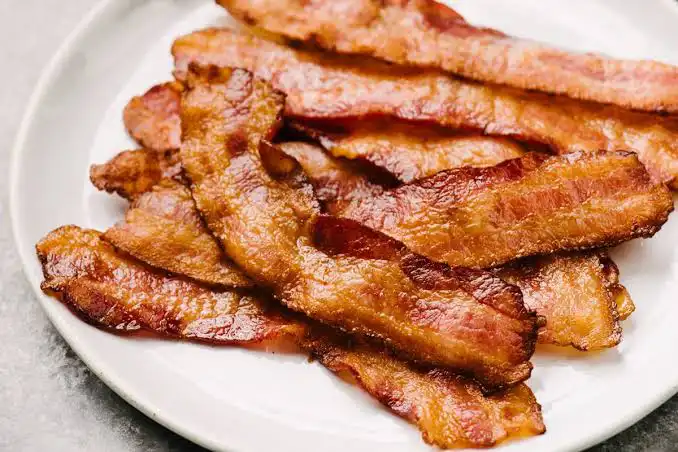Is Bacon Halal? (Beef, Turkey, Duck, Chicken)

For Muslims who follow halal dietary guidelines, the question of whether bacon can be halal or haram is one that comes up frequently.
Bacon, traditionally associated with pork, is often thought to be automatically haram due to its association with swine. However, with the rise of alternatives like beef, turkey, duck, and chicken bacon, the discussion around halal bacon has evolved.
In this article, we will explore whether bacon can be halal and what criteria must be met for it to be considered permissible for Muslims. We’ll also take a closer look at how halal bacon is made and the different types available.
Is Bacon Halal?
No, bacon is not halal. Bacon is made from pork, which is prohibited in Islam. The consumption of pork and its by-products is explicitly forbidden (haram) according to Islamic dietary laws. For bacon to be halal, it must be made from an animal that is halal for Muslims to consume, and the animal must be slaughtered according to Islamic guidelines.
What Makes Bacon Haram?
The assumption that all bacon is haram stems from the fact that the most common type of bacon is pork-based. In Islam, pork is explicitly forbidden in the Quran, and its consumption is considered haram (forbidden). This is clearly stated in Surah Al-Baqarah:
“He has only forbidden you ˹to eat˺ carrion, blood, swine, and what is slaughtered in the name of any other than Allah” (Quran 2:173).
Since traditional bacon is made from pork, it is undeniably haram. However, bacon can also be made from other types of meat, and not all bacon needs to be avoided.
READ ALSO: Is Coffee Halal Or Haram? (And Caffeine)
Halal Alternatives to Pork Bacon
While pork-based bacon is haram, many halal-conscious consumers turn to alternatives that are permissible. These alternatives include beef bacon, turkey bacon, chicken bacon, and even duck bacon. Since the meat from these animals is halal for Muslims, these forms of bacon can be considered permissible under the right conditions.
However, it’s important to note that simply being made from halal meat does not automatically make the product halal. The slaughter process plays a key role in determining whether the final product is permissible to eat.

Conditions for Halal Bacon
In Islam, the animal must be slaughtered in accordance with the principles of Shariah law. This means the animal must be slaughtered in the name of Allah, the blood must be drained from the body, and the process should be done swiftly and humanely.
If the animal is not slaughtered in this manner, then the meat, even from halal animals, becomes haram.
For example, beef, turkey, chicken, or duck bacon is only halal if the animals are properly slaughtered and handled according to Islamic guidelines. This is why it’s crucial to verify whether the meat used in the bacon was sourced from a trusted halal supplier with certification.
What is Halal Bacon Made Of?
Halal bacon is made from halal animals, such as beef, turkey, chicken, or duck, which have been slaughtered according to Islamic Shariah.
Once the meat is obtained, it undergoes the bacon-making process. This involves curing the meat by salting it, refrigerating it, and letting it sit to draw out moisture. The meat is then often smoked to add that distinctive bacon flavor.
Unlike pork bacon, which is always haram, halal bacon provides a way for Muslims to enjoy a similar food product made from permissible animals. The key factor is ensuring the meat itself comes from a halal source and was prepared properly.
Types of Halal Bacon
There are various types of halal bacon available to consumers:
- Beef Bacon: Since beef is permissible for Muslims, beef bacon is a popular choice. It provides a hearty and flavorful alternative to pork bacon. As long as the beef comes from a properly slaughtered animal, beef bacon is considered halal.
- Turkey Bacon: Turkey bacon is perhaps the most popular alternative for those looking for a lighter option. Turkey is a halal animal, and as long as it is slaughtered according to Islamic principles, turkey bacon is halal. It is widely available in many supermarkets.
- Chicken Bacon: Chicken bacon is another alternative that has gained popularity. Similar to turkey, chicken is halal as long as it has been properly slaughtered. Chicken bacon is a great option for those who prefer a milder taste.
- Duck Bacon: For those looking for a richer, more luxurious flavor, duck bacon is an option. Like the other types of bacon, duck bacon is halal only if the duck was slaughtered in accordance with Islamic guidelines.
Is Bacon Flavor Halal?
Another point of confusion is whether bacon flavor is halal. Many food products, like chips or bacon bits, are labeled as “bacon-flavored.” These can be either halal or haram, depending on the ingredients used to create the flavor.
If the bacon flavor is derived from pork, it is haram. However, some bacon-flavored products are made using plant-based ingredients, like soy, which are halal.
For example, some bacon bits are made entirely from soy and are halal, even though they taste like bacon. Always check the ingredients and look for halal certification to be sure.
Additionally, some snacks, such as chips, may contain artificial bacon flavor but have hidden pork-based ingredients, making them haram. It’s crucial to read the labels carefully and avoid anything that contains pork derivatives.
Common Misconceptions About Halal Bacon
Many people assume that bacon, regardless of its source, is always haram because it is associated with pork. However, this is a misconception.
As long as the bacon is made from halal meat, such as beef, turkey, chicken, or duck, and the meat has been slaughtered according to Islamic law, the bacon is permissible for Muslims to eat.
It’s also common for people to assume that bacon-flavored products are automatically haram. This isn’t necessarily true. Some bacon-flavored products are made using halal ingredients, and it’s possible to enjoy the flavor of bacon without consuming pork.
Practical Tips for Buying Halal Bacon
When shopping for halal bacon, it’s essential to keep a few things in mind:
- Look for Halal Certification: Ensure that the meat is certified halal by a trusted organization. This guarantees that the meat comes from an animal slaughtered according to Islamic principles.
- Check the Source: Always verify the supplier or butcher to ensure the meat was sourced from a halal-certified facility.
- Read the Labels: For processed foods, like bacon-flavored chips or bacon bits, carefully read the ingredient list to avoid hidden pork-based ingredients.
- Ask Questions: When in doubt, ask your butcher or the store where you’re purchasing the bacon about the slaughter process. It’s important to ensure the meat was prepared in a halal manner.
Conclusion
In conclusion, bacon can be halal as long as it is made from halal animals like beef, turkey, chicken, or duck, and the animal is slaughtered in accordance with Islamic guidelines. While pork bacon is haram, there are many halal alternatives available for Muslims who wish to enjoy bacon without compromising their dietary beliefs.
It’s important to verify the source of the meat and ensure that it follows the proper halal procedures. By being informed and cautious, halal-conscious consumers can enjoy a variety of bacon options without violating Islamic dietary laws.






